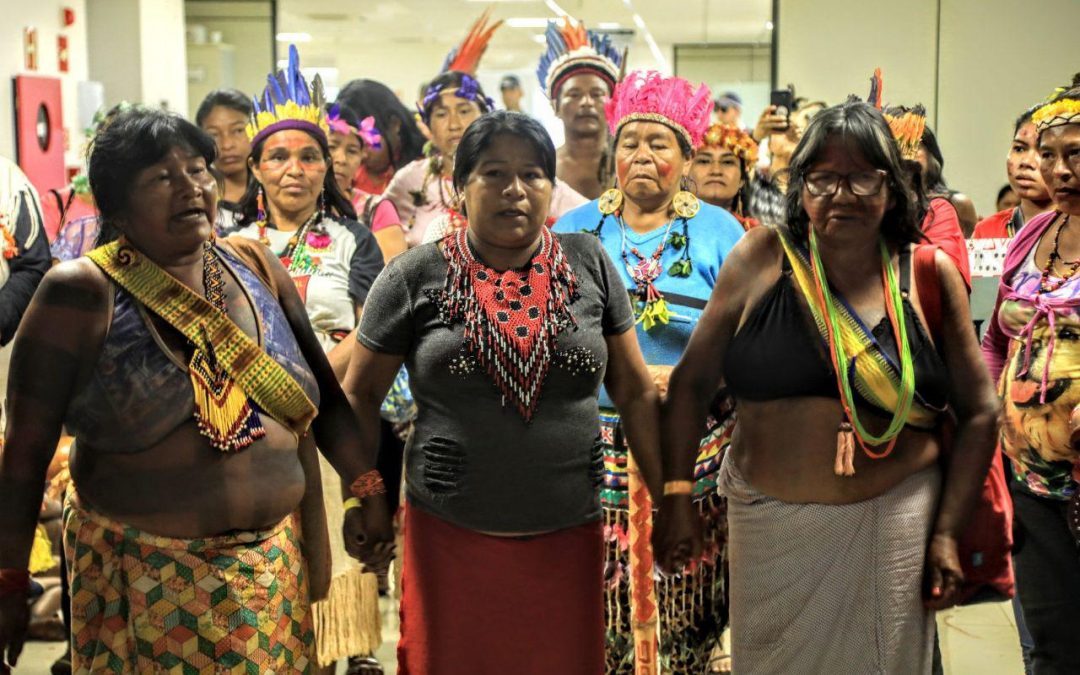On August 9, 2019, International Day of the World’s Indigenous Peoples, we indigenous women left our communities for Brasilia. We are nearly 2,000 indigenous women raising our voices and those of countless others in defense of our territories. We are gathered in the Brazilian capital centering women’s leading role in our history and our empowerment throughout the First Indigenous Women’s March, the theme of which affirms and strengthens our identity – “Territory: our body, our spirit.”
We are also here to express our deep indignation and vehement repudiation of the Bolsonaro government and its proposals to dismantle the institutions and social policies that deal with our people. At this time in particular we raise our voices against the dismantling of the National Policy on Indigenous Health Care.
The 1988 Federal Constitution recognizes our right to our own “social structures, customs, languages, beliefs and traditions” and our “original rights over the land” that we have traditionally occupied. It therefore ensures our right to specific and differentiated public policies.
However, President Bolsonaro insists in his authoritarian manner on abolishing these fundamental rights won in the transition to democracy. This is the aim of Provisional Measure 890 replacing the “More Doctors” program (Mais Médicos) with a new program known as “Doctors for Brazil.” In reality, the goal of this new policy is to privatize the services offered by the Unified Health System (SUS), including those offered as part of the National Policy on Indigenous Health Care.
In Provisional Measure 890, the Bolsonaro Government also proposes to establish an new social service agency called the Agency for the Development of Primary Health Care (ADAPS). This new bureaucracy serves as an absurd justification to open up primary care as a new market for the private sector to exploit.
Among other functions ADAPS will serve to:
1) provide primary health care services covered under the scope of SUS;
2) develop education, research and other activities that integrate teaching and service;
3) promote the development and incorporation of health care and management technology, responsibilities that go beyond hiring doctors in vulnerable and remote areas; and
4) the agency’s structure and principles lay the groundwork for privatizing these services, training, research and other activities provided under the scope of primary care.
Impacts on Indigenous Health
– Provisional Measure 890 excludes all the structures that provide for public input and participation within SUS. The composition and supervision of ADAPS includes no representation from the civilian National Health Council (CNS), much less that of indigenous peoples. However, the measure guarantees the participation of private entities.
– The proposal would bring about major structural changes to how health care in Indigenous Special Health Districts (DSEIs) is carried out and organized, as the Special Secretary on Indigenous Health’s work focuses on primary care. This means that most of its work would fall within the scope of this new, unaccountable agency.
It is important to stress that the proposal has not been discussed or presented in any consultation with our peoples. Further, the proposition of creating a separate social service agency dealing with indigenous health care has already discussed at length. The former government proposed creating a National Institute of Indigenous Health (INSI) in 2014, and our representatives debated and ultimately rejected the project. Now we are rejecting the privatization of the indigenous health subsystem.
Given these facts and the Bolsonaro government’s attacks against us, we INDIGENOUS WOMEN, on this day, August 12, decided to occupy the Special Secretariat of Indigenous Health (SESAI), reaffirming the position of our peoples against any prospect to devolve indigenous health care to the local level or to privatize these services. We also repudiate attempts to commercialize our wisdom and traditional knowledge. We are against all threats and attempts to negotiate over our way of life.
We reaffirm our commitment to continue the struggle in defense of our territories, our wisdom and traditional knowledge, and to specific and differentiated policies for our communities, especially in the areas of health care and education.
We also reaffirm our commitment as indigenous women from all over Brazil that we will not be quiet, we will not back down, and we will not give up fighting for lives and for our future.
We will keep on MARCHING… Territory: our body, our spirit!
Brasilia – Federal District. August 12, 2019.
BRAZILIAN INDIGENOUS PEOPLES’ ARTICULATION – APIB

